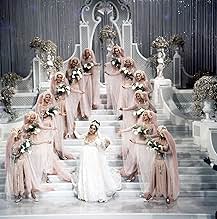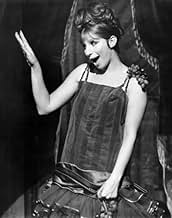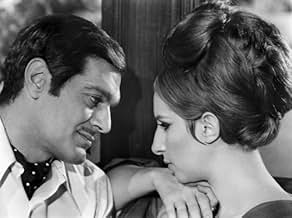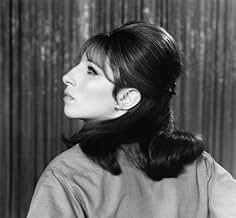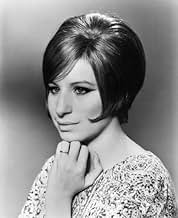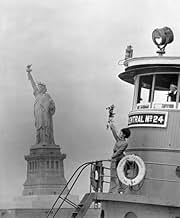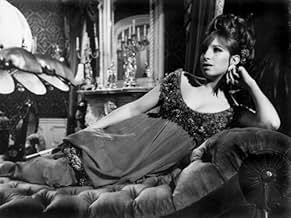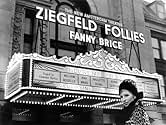IMDb रेटिंग
7.4/10
27 हज़ार
आपकी रेटिंग
अपनी भाषा में प्लॉट जोड़ेंThe life of Fanny Brice, famed comedienne and entertainer of the early 1900s: her rise to fame as a Ziegfeld Girl, her subsequent career, and her personal life, particularly her relationship... सभी पढ़ेंThe life of Fanny Brice, famed comedienne and entertainer of the early 1900s: her rise to fame as a Ziegfeld Girl, her subsequent career, and her personal life, particularly her relationship with Nick Arnstein.The life of Fanny Brice, famed comedienne and entertainer of the early 1900s: her rise to fame as a Ziegfeld Girl, her subsequent career, and her personal life, particularly her relationship with Nick Arnstein.
- 1 ऑस्कर जीते
- 8 जीत और कुल 16 नामांकन
Karen Stride
- Ziegfeld Girl
- (as Karen Lee)
फ़ीचर्ड समीक्षाएं
There are two important things to remember about Funny Girl when writing about it or discussing it. The first is Nicky Arnstein was still alive in 1964 when it debuted on Broadway, he died the following year. The second is that Ray Stark, the producer of Funny Girl on stage and on the screen is the son-in-law of Fanny Brice and Nicky Arnstein. So off the bat you know you're going to get a sanitized version.
Not that what they created was bad, how could it be for giving Barbra Streisand the role that made her a star on both stage and screen. Fanny Brice didn't do too bad out of it either, unlike a lot of her contemporaries she lives on through the artistry and interpretation of an icon in a future age.
But was Fanny's story ever given the literary dry process cleaning. Eliminated was her brief marriage to a first husband. Changed is the fact that she knew exactly who at what Arnstein was before she married him. Arnstein was a big time con artist who had no shame whatsoever in using his famous wife's name as a come on. Fanny herself though was never involved in any of his schemes. Arnstein did in fact take the fall and never squealed on any of the ones behind him who certainly were more than capable of reprisals against him and possibly against Fanny Brice.
Jule Styne and Bob Merrill wrote the original songs for the Broadway score and added one song, Funny Girl, for the film. But still the two standouts are Barbra Streisand's classic People and Don't Rain On My Parade, a couple of standards she's made almost exclusively her own. I don't think anyone else would attempt to sing them.
Added to the film are a couple of contemporary songs that Fanny Brice made famous that Barbra reinterpreted, the classic My Man, a song she sang before Nicky Arnstein went to the joint, but still is identified as her lament for her husband in stir. She also sang Second Hand Rose, a really great comedy song, emphasizing Brice's Jewish heritage. I wish a couple of others had gotten in there. I've got Brice recordings of Cooking Breakfast For The One I Love and I'm An Indian. That last one is especially hysterical, Brice did it one of the Ziegfeld Follies dressed as an indigenous person to this continent with the last line being "I'm a Yiddishe Squaw". It's great to hear and must have been fabulous to see.
Funny Girl got seven nominations which included Best Picture, Best Sound, Best Song, Best Musical Scoring, Best Editing, Best Cinematography and a Best Supporting Actress nomination for Kay Medford, the only other player from Broadway besides Streisand to be in the film. But the only Oscar it got was a shared one when Barbra Streisand tied for Best Actress with Katharine Hepburn. One of the very few times someone got an Oscar for their very first big screen effort.
Of course two things helped Barbra greatly. One was a role she had made her own and the second was direction by William Wyler who has won Best Director three times in his career and directed more players to Academy Awards than any other. Barbra was his last. Oddly enough he wasn't nominated for Best Director.
Those who are interested in seeing Fanny Brice as she really was can see her in The Great Ziegfeld, The Ziegfeld Follies, and Everybody Sing all of which are out on DVD and/or VHS. I think Barbra channeled more of Fanny into Funny Girl than the sequel Funny Lady, but I'll let you the viewer be the judge of that.
You can't go wrong seeing and hearing Barbra Streisand do some of the best material ever written for her in both films.
Not that what they created was bad, how could it be for giving Barbra Streisand the role that made her a star on both stage and screen. Fanny Brice didn't do too bad out of it either, unlike a lot of her contemporaries she lives on through the artistry and interpretation of an icon in a future age.
But was Fanny's story ever given the literary dry process cleaning. Eliminated was her brief marriage to a first husband. Changed is the fact that she knew exactly who at what Arnstein was before she married him. Arnstein was a big time con artist who had no shame whatsoever in using his famous wife's name as a come on. Fanny herself though was never involved in any of his schemes. Arnstein did in fact take the fall and never squealed on any of the ones behind him who certainly were more than capable of reprisals against him and possibly against Fanny Brice.
Jule Styne and Bob Merrill wrote the original songs for the Broadway score and added one song, Funny Girl, for the film. But still the two standouts are Barbra Streisand's classic People and Don't Rain On My Parade, a couple of standards she's made almost exclusively her own. I don't think anyone else would attempt to sing them.
Added to the film are a couple of contemporary songs that Fanny Brice made famous that Barbra reinterpreted, the classic My Man, a song she sang before Nicky Arnstein went to the joint, but still is identified as her lament for her husband in stir. She also sang Second Hand Rose, a really great comedy song, emphasizing Brice's Jewish heritage. I wish a couple of others had gotten in there. I've got Brice recordings of Cooking Breakfast For The One I Love and I'm An Indian. That last one is especially hysterical, Brice did it one of the Ziegfeld Follies dressed as an indigenous person to this continent with the last line being "I'm a Yiddishe Squaw". It's great to hear and must have been fabulous to see.
Funny Girl got seven nominations which included Best Picture, Best Sound, Best Song, Best Musical Scoring, Best Editing, Best Cinematography and a Best Supporting Actress nomination for Kay Medford, the only other player from Broadway besides Streisand to be in the film. But the only Oscar it got was a shared one when Barbra Streisand tied for Best Actress with Katharine Hepburn. One of the very few times someone got an Oscar for their very first big screen effort.
Of course two things helped Barbra greatly. One was a role she had made her own and the second was direction by William Wyler who has won Best Director three times in his career and directed more players to Academy Awards than any other. Barbra was his last. Oddly enough he wasn't nominated for Best Director.
Those who are interested in seeing Fanny Brice as she really was can see her in The Great Ziegfeld, The Ziegfeld Follies, and Everybody Sing all of which are out on DVD and/or VHS. I think Barbra channeled more of Fanny into Funny Girl than the sequel Funny Lady, but I'll let you the viewer be the judge of that.
You can't go wrong seeing and hearing Barbra Streisand do some of the best material ever written for her in both films.
Quite simply, Barbra Streisand's extraordinary, scintillating Oscar-winning debut in this classic is one of the finest musical-comedy performances ever committed to celluloid. Better than that...I'd venture to say that alongside Vivien Leigh's masterful performance in "Gone With The Wind," Barbra's portrayal of vaudeville icon Fanny Brice may be one of the most ambitious, captivating turns by a lead actress ever captured on film. Even Barbra-phobes would have to concede that the woman completely knocked herself out with "Funny Girl" and her renditions of "I'm The Greatest Star," "My Man," "People" and especially the pulse-jolting "Don't Rain On My Parade" rank right up there with the best of Judy Garland ("Over The Rainbow," "The Trolley Song" and "The Man That Got Away."). Because Streisand has been an exalted Hollywood legend for many decades, people tend to almost take her remarkable talents - both as an actress and as a singer - for granted now but this opulent musical, sparkling score and her thrilling, take-no-prisoners performance will endure as a testament to what pure show business, high octane theatricality and legitimate talent are all about. Sing Proud, Barbra!
...Perhaps not. But for nearly 2 1/2 hours in "Funny Girl," Barbra Streisand at least makes a convincing case for herself.
Forget about the television airings you've seen. Throw away your old video cassette copy. Instead, see the restored, widescreen, road show version now in limited theatrical release. It is the ONLY way to truly appreciate the talents of Ms. Streisand and, more notably, the film's brilliant director, William Wyler.
Movies today no longer look like movies. The highest compliment one can pay "Funny Girl" is that it is a grand, glorious MOVIE in the truest sense. Wyler's brilliance is never more evident than in his glorious treatment of the "Don't Rain on My Parade" sequence, the stunning camerawork of "The Swan," and the incredibly effective set-up of the "My Man" finale.
Ms. Streisand doesn't really give a performance; she simply is Barbra. Every "Barbra-ism" that we have come to know, love and hate over the years is already crystallized at this point. Her brashness can be off-putting, but by the end of the movie, one is completely won over by the sheer enormity of her talent and presence. Yes, you can see the beginnings of the blind egomania that has marred her performances for the last 20-odd years (to be generous); but you cannot deny her brilliance, either. And to see her extraordinary face in full-screen close up is breathtaking. Kudos to the director, lighting director, and make-up artist for making Streisand appear so wonderful in this.
From the sweepingly orchestrated titles to the high-drama impact of the showstopping finale, this is Entertainment with a capital E. About 20 minutes could have been trimmed, and exactly why Omar Sharif was cast remains a mystery; but at the end of the picture, these quibbles are trivial. Did I laugh? Yes. Did I cry? Yes. Was I thrilled, excited, entertained? You betcha.
Forget about the television airings you've seen. Throw away your old video cassette copy. Instead, see the restored, widescreen, road show version now in limited theatrical release. It is the ONLY way to truly appreciate the talents of Ms. Streisand and, more notably, the film's brilliant director, William Wyler.
Movies today no longer look like movies. The highest compliment one can pay "Funny Girl" is that it is a grand, glorious MOVIE in the truest sense. Wyler's brilliance is never more evident than in his glorious treatment of the "Don't Rain on My Parade" sequence, the stunning camerawork of "The Swan," and the incredibly effective set-up of the "My Man" finale.
Ms. Streisand doesn't really give a performance; she simply is Barbra. Every "Barbra-ism" that we have come to know, love and hate over the years is already crystallized at this point. Her brashness can be off-putting, but by the end of the movie, one is completely won over by the sheer enormity of her talent and presence. Yes, you can see the beginnings of the blind egomania that has marred her performances for the last 20-odd years (to be generous); but you cannot deny her brilliance, either. And to see her extraordinary face in full-screen close up is breathtaking. Kudos to the director, lighting director, and make-up artist for making Streisand appear so wonderful in this.
From the sweepingly orchestrated titles to the high-drama impact of the showstopping finale, this is Entertainment with a capital E. About 20 minutes could have been trimmed, and exactly why Omar Sharif was cast remains a mystery; but at the end of the picture, these quibbles are trivial. Did I laugh? Yes. Did I cry? Yes. Was I thrilled, excited, entertained? You betcha.
There are not enough superlatives in the world to bestow on Barbra Streisand for her rags-to-riches portrayal of 20s Ziegfeld Follies star Fanny Brice. To say she gives the single most triumphant musical performance ever showcased on the silver screen could be close. I am constantly bowled over with each viewing at how the 26-year-old Brooklyn novice ever pulled off this incredible stunt. Cinderella playing Cinderella. Even the finicky Hollywood powers-that-be, who NEVER use untried screen talent for such a weighty role (Julie Andrews and "My Fair Lady" come to mind), knew that nobody but Barbra could inhabit this part. She won the Oscar, naturally, and it was befitting that the newcomer should share this honor with perhaps the greatest screen legend ever, Katharine Hepburn.
Barbra's Fanny Brice first conquered Broadway where she lost the Tony award to another irrepressible talent, Carol Channing, for "Hello Dolly!" She got her revenge of sorts years later when she won the coveted screen role of Dolly due strictly to her auspicious debut in "Funny Girl." Transferred to celluloid, the movie loosens its bustles quite a bit and grants more breathing room for Barbra to expand her natural comic and dramatic talents both keenly and intimately amid the elaborate sets and costumes.
The timing of this film couldn't have been better for Streisand. The late 60s ushered in a new legion of stars. The rash of talent coming to the forefront purposely lacked the super-model good looks and incredibly-sculpted physiques of their predecessors. Audiences now clamored for realism...human imperfection. What less attractive guys like Dustin Hoffman and Al Pacino did for the men, Barbra did for the distaff side. She dragged out her own Cinderella version, making a virtue of her odd looks and gawky gait while laying out her two big trump cards -- she was a supreme song stylist and a gifted, self-deprecating cut-up.
Hardly ever off screen, Streisand totally immerses herself in the role of chorus clown-turned-Ziegfeld headliner, weaving a spell around each and every song she touches. From the stubbornly optimistic "I'm the Greatest Star" to the profoundly touching "My Man", the actress matures Brice into the glowing swan of her own dreams, while exposing a deep, personal vulnerability she never recaptured (or allowed) again on screen -- to her detriment.
Despite heavy critical lambasting, I still say exotically handsome Omar Sharif was indeed the consummate choice to play wanderlust husband and card shark Nicky Arnstein. Polished, prideful and totally in his element as the global-gambling playboy, one can believe the ungainly Fanny (or Streisand, for that matter) placing this glossy god on a pedestal. It may not appear to be much of a stretch (in real life, Sharif was a world-class bridge player), but he owns the part as much as delightful Kay Medford does as Brice's droll Jewish mama. Everyone else, however, is pretty expendable. It's been said that Anne Francis blamed Streisand for her supposedly top featured role being butchered. If it's true, she has an open-and-shut case. Francis was left with a nothing part.
Highly fictionalized and weak as biography, Streisand champions above the sometimes grandiose material from the moment she utters her first classic words: "Hello, gorgeous!" And so she is.
Barbra's Fanny Brice first conquered Broadway where she lost the Tony award to another irrepressible talent, Carol Channing, for "Hello Dolly!" She got her revenge of sorts years later when she won the coveted screen role of Dolly due strictly to her auspicious debut in "Funny Girl." Transferred to celluloid, the movie loosens its bustles quite a bit and grants more breathing room for Barbra to expand her natural comic and dramatic talents both keenly and intimately amid the elaborate sets and costumes.
The timing of this film couldn't have been better for Streisand. The late 60s ushered in a new legion of stars. The rash of talent coming to the forefront purposely lacked the super-model good looks and incredibly-sculpted physiques of their predecessors. Audiences now clamored for realism...human imperfection. What less attractive guys like Dustin Hoffman and Al Pacino did for the men, Barbra did for the distaff side. She dragged out her own Cinderella version, making a virtue of her odd looks and gawky gait while laying out her two big trump cards -- she was a supreme song stylist and a gifted, self-deprecating cut-up.
Hardly ever off screen, Streisand totally immerses herself in the role of chorus clown-turned-Ziegfeld headliner, weaving a spell around each and every song she touches. From the stubbornly optimistic "I'm the Greatest Star" to the profoundly touching "My Man", the actress matures Brice into the glowing swan of her own dreams, while exposing a deep, personal vulnerability she never recaptured (or allowed) again on screen -- to her detriment.
Despite heavy critical lambasting, I still say exotically handsome Omar Sharif was indeed the consummate choice to play wanderlust husband and card shark Nicky Arnstein. Polished, prideful and totally in his element as the global-gambling playboy, one can believe the ungainly Fanny (or Streisand, for that matter) placing this glossy god on a pedestal. It may not appear to be much of a stretch (in real life, Sharif was a world-class bridge player), but he owns the part as much as delightful Kay Medford does as Brice's droll Jewish mama. Everyone else, however, is pretty expendable. It's been said that Anne Francis blamed Streisand for her supposedly top featured role being butchered. If it's true, she has an open-and-shut case. Francis was left with a nothing part.
Highly fictionalized and weak as biography, Streisand champions above the sometimes grandiose material from the moment she utters her first classic words: "Hello, gorgeous!" And so she is.
Every time a film is made about a real-life figure, particularly a show business figure, people love to complain that the movie is not accurate regarding the facts of that person's life. If the truth be told, if movie biographies were strictly about the facts, no one would go to see them, because for the most part, the facts don't make for great entertainment and Fanny Brice is no exception. The 1968 musical FUNNY GIRL has been maligned for years because it is not a very accurate representation of the facts of Fanny Brice's life. If you want to learn about Fanny Brice's life, read a biography or go on the internet, but if you want to see an amazing movie musical spotlighting a legendary performer at the beginning of her amazing career, then you can't beat FUNNY GIRL, the 1968 musical based on the 1964 Broadway musical that made Barbra Streisand a star. Streisand tied with Katharine Hepburn for the Best Actress Oscar for this charismatic star turn as the young girl from Henry Street who becomes a big star of the Ziegfeld Follies and has a heartbreaking romance with a charming gambler named Nick Arnstein, played by Omar Sharif. Streisand is in practically every frame of this film and never makes you wish otherwise...one of the great performances in the history of cinema...whether she is defying Florenz Ziegfeld by refusing to appear in the finale or chasing an ocean liner to be with Nick, Streisand gives the one-woman performance of a lifetime here. Directed by Oscar-winner William Wyler, Streisand is lovingly photographed and effectively showcases the Jule Styne-Bob Merrill score, which includes classics like "People" and "Don't Rain On My Parade". Some changes have been made in the score from the stage musical but Streisand makes it all work and the finale "My Man" is just devastating. It's not an accurate biography of the vaudeville legend, but as a dazzling and entertaining movie musical, it's hard to top this one.
क्या आपको पता है
- ट्रिवियाWilliam Wyler was asked by a friend whether Barbra Streisand had been hard to work with. He replied, "No, not too hard, considering it was the first movie she ever directed."
- गूफ़After Nick's release from prison in 1927, he and Fanny did not sadly but amicably part. Instead, Nick rewarded Fanny's years of support by almost immediately starting a series of affairs. Fanny demanded he give her grounds for divorce and even had their children's last name legally changed to Brice. Although he and Fanny would meet again several years later, he never attempted to see his children again.
- भाव
Fannie Brice: I'm a bagel on a plate full of onion rolls!
- इसके अलावा अन्य वर्जनThe original theatrical version included an additional overture before the opening credits, an intermission after "Don't Rain On My Parade," and exit music after the end credits. These additional music pieces have been restored for the DVD release.
- कनेक्शनFeatured in This Is Streisand (1968)
टॉप पसंद
रेटिंग देने के लिए साइन-इन करें और वैयक्तिकृत सुझावों के लिए वॉचलिस्ट करें
- How long is Funny Girl?Alexa द्वारा संचालित
विवरण
- रिलीज़ की तारीख़
- कंट्री ऑफ़ ओरिजिन
- भाषा
- इस रूप में भी जाना जाता है
- Funny Girl: Chica rara
- फ़िल्माने की जगहें
- Jersey Central Railway Station, जर्सी शहर, न्यू जर्सी, संयुक्त राज्य अमेरिका('Don't Rain On My Parade' sequence)
- उत्पादन कंपनियां
- IMDbPro पर और कंपनी क्रेडिट देखें
बॉक्स ऑफ़िस
- बजट
- $1,41,00,000(अनुमानित)
- US और कनाडा में सकल
- $5,22,23,306
- US और कनाडा में पहले सप्ताह में कुल कमाई
- $65,560
- 3 सित॰ 2001
- दुनिया भर में सकल
- $5,22,25,786
- चलने की अवधि2 घंटे 31 मिनट
- रंग
- पक्ष अनुपात
- 2.35 : 1
इस पेज में योगदान दें
किसी बदलाव का सुझाव दें या अनुपलब्ध कॉन्टेंट जोड़ें





